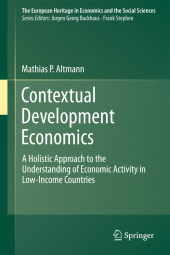 Neuerscheinungen 2012Stand: 2020-01-07 |
Schnellsuche
ISBN/Stichwort/Autor
|
Herderstraße 10
10625 Berlin
Tel.: 030 315 714 16
Fax 030 315 714 14
info@buchspektrum.de |

Matthias P. Altmann
Contextual Development Economics
A Holistic Approach to the Understanding of Economic Activity in Low-Income Countries
Repr. d. Ausg. v. 2011. 2012. xix, 287 S. 6 Tabellen. 235 mm
Verlag/Jahr: SPRINGER, BERLIN 2012
ISBN: 1-461-42765-7 (1461427657)
Neue ISBN: 978-1-461-42765-0 (9781461427650)
Preis und Lieferzeit: Bitte klicken
Poverty still persists in today´s low-income countries, despite decades of international aid and extensive research on growth and development. Contextual Development Economics meets this challenge with a holistic understanding of the context-specific factors that influence economic behavior in poor countries.
Poverty still persists in today´s low-income countries despite decades of international aid, and extensive research on the determinants of growth and development. The book argues that meeting this challenge requires a holistic understanding of the context-specific factors that influence economic behavior and structures in poor countries. Contextual Development Economics approaches this task by offering a methodology that allows analysing the dynamic interrelations between economic, cultural and historical determinants of economic life in low-income countries. The book starts with an empirical inquiry into the economic characteristics of low-income countries that create the context by which the specific forms of organising economic activity in these countries are determined. It then looks at how different generations of development economists sought to explain economic realities in low-income countries from the 1940s through today. The book finally synthesises the results from this empirical and methodological analysis with insights from an inquiry into contributions of the German Historical School, from which it borrows the concept of the economic style as a methodological alternative to the universal and hence often irrelevant models of mainstream development economics.
This book offers a promising perspective for the future of development economics that will be of interest to researchers and development practitioners alike. It will also be relevant for academics and students with an interest in applications of the method and concepts of the Historical School to contemporary problems.
Introduction.- Poverty.- Transaction Costs.- Private Governance.- Informal Economic Activity.- The First Generation of Development Economists.- The Second Generation--Return to the Mainstream.- The Third Generation--Institutional Turn and the "New Development Economics".- Conclusions from the Past and the Agenda for a New Generation of Development Economics.- Emerging New Directions in Development Economics.- German Historical Economics as Development Economiccs.- From Stage Theories to the Concept of Economic Styles.- The Relevance of the Historical School for the Study of Low-Income Countries.- Conclusions.


